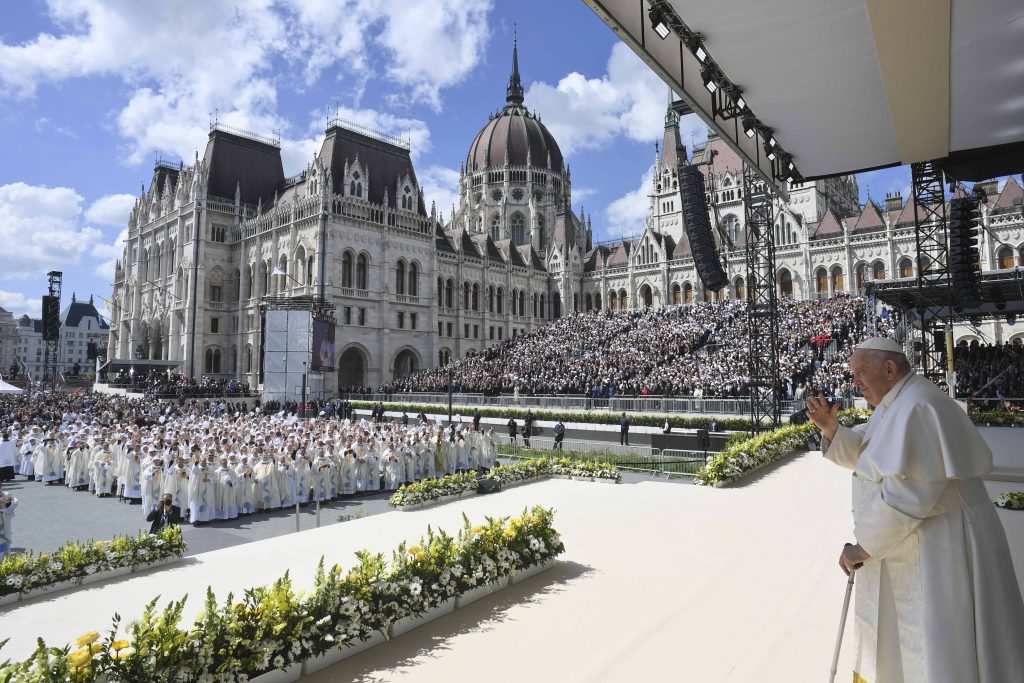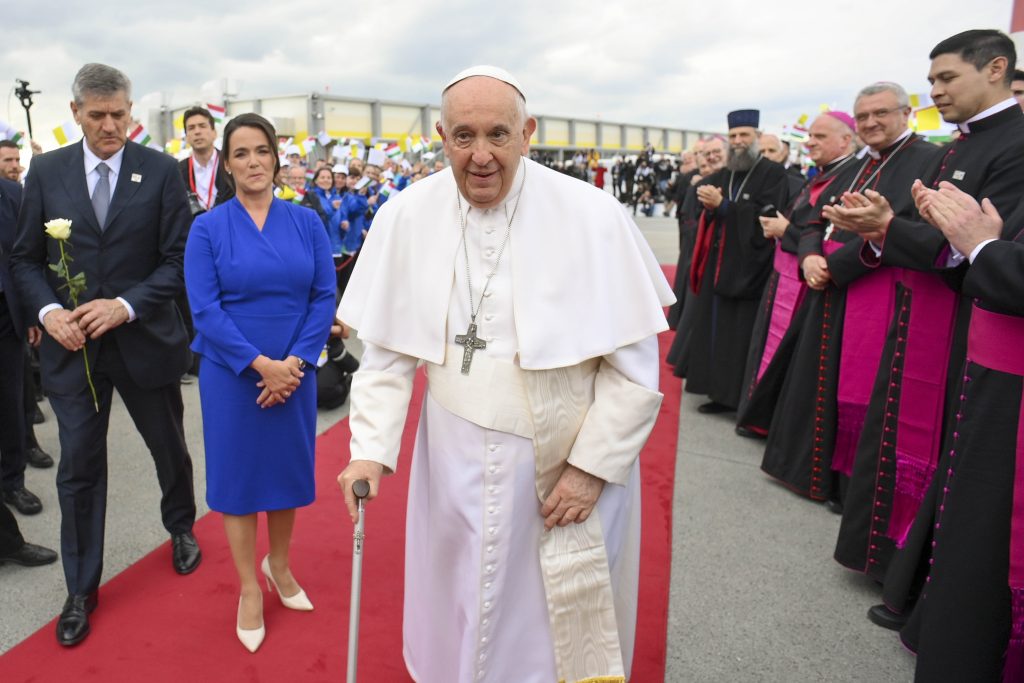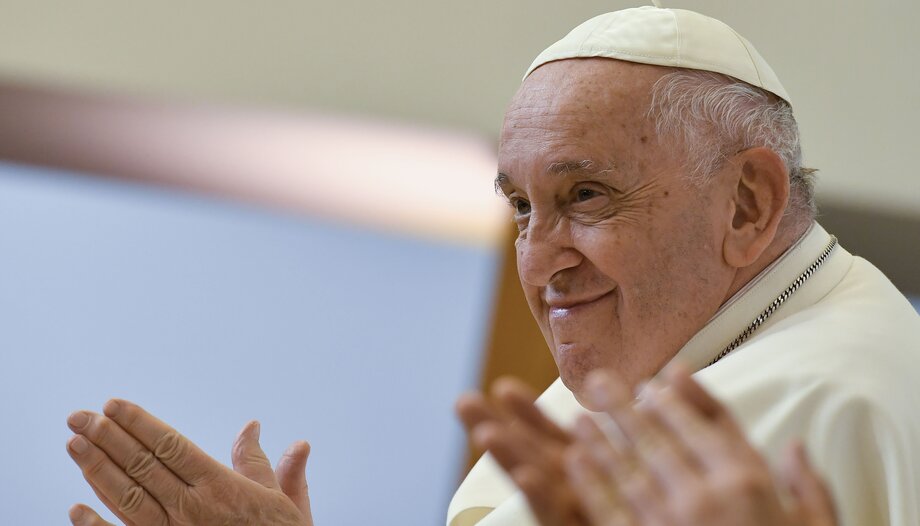At 6 p.m. a plane took off from Hungary to take Pope Francis back to Rome. After a few full days in the Hungarian nation, the Holy Father bid farewell in a ceremony without speeches at Budapest's international airport.
Just a few hours earlier, Francis celebrated Holy Mass in Kossuth Lajos Square, where the Hungarian Parliament is located. During the homily, the Pope invited all the participants to contemplate the figure of the Good Shepherd, Jesus Christ, taking the today's readings. For this reason, he noticed two of Jesus' actions, which, as the GospelHe works for his sheep: first he calls them, then he leads them out".
God's call
That initial call of the Lord is the origin of new life. "At the beginning of our salvation history is not us with our merits, our abilities, our structures; at the origin is God's call, his desire to reach us, his concern for each one of us, the abundance of his mercy that wants to save us from sin and death, to give us life in abundance and endless joy."
The Pope emphasized that Christ, long before any of us could respond, "bore our iniquities and bore our faults, leading us back to the heart of the Father". And not only that, but "even today, in every situation of life, in what we carry in our hearts, in our wanderings, in our fears, in the sense of defeat that sometimes assails us, in the prison of sadness that threatens to imprison us, He calls us."
From God's universal call is born one of the essential characteristics of the Church: catholicity. As Francis explained in his homily, "this is catholicity: all of us Christians, called by name by the Good Shepherd, are invited to welcome and spread his love, to make his sheepfold inclusive and never exclusive. And, therefore, we are all called to cultivate relationships of fraternity and collaboration, without dividing ourselves among ourselves, without considering our community as a reserved environment, without allowing ourselves to be dragged down by the concern to defend each one's own space, but opening ourselves to mutual love".
A Church on the way out
The Pope then explained the second action of Christ narrated in the Gospel. "First we are gathered into the family of God to be constituted his people, but then we are sent out into the world so that, with courage and without fear, we may be heralds of the Good News, witnesses to the love that has regenerated us."
It is the Lord himself who "urges us to go out to our brothers and sisters. And let us remember it well: all of us, without exception, are called to this, to go out of our comforts and have the courage to reach all the peripheries that need the light of the Gospel".

But what does it really mean to be a Church going forth? The Holy Father summed it up in a single phrase during the sermon: "to be on the way out" means for each of us to become, like Jesus, an open door.
Francis insisted on this idea by making a request addressed to all. "Please, let us open the doors! Let us also try - with words, gestures, daily activities - to be like Jesus, an open door, a door that never closes in anyone's face, a door that allows us to enter to experience the beauty of the Lord's love and forgiveness."
Finally, the Pope wanted to send to all Christians, and especially to Hungarians, words of encouragement. He asked that "we should never lose heart, never let ourselves be robbed of the joy and peace that he has given us; let us not close ourselves up in problems or apathy. Let us allow ourselves to be accompanied by our Shepherd; with Him, our lives, our families, our Christian communities and all Hungary will shine with new life".
Saint Mary, Queen and Patroness
The Holy Father prayed the Regina Caeli and gave a brief meditation, as he does when he presides the prayer from the Vatican. In his words he thanked the political representatives, diplomats and authorities for their presence. He also addressed the priests, seminarians, consecrated men and women, members of the clergy and representatives of other religions to thank them for their collaboration and assistance.
In his meditation, he wanted to place all Hungarians under the protection of the Virgin Mary. He included in this petition the whole of Europe, saying: "from this great city and from this noble country I would like to entrust once again to her heart the faith and the future of the entire European continent, which I have been thinking about these days and, in a particular way, the cause of peace".
The Pope continued his prayer: "You are the Queen of peace, instill in the hearts of men and of those responsible for nations the desire to build peace, to give the young generations a future of hope, not of war; a future full of cradles, not of tombs; a world of brothers, not of walls".
And he concluded with the following words: "We pray to you for the Church in Europe, that she may find the strength of prayer; that she may discover in you humility and obedience, the ardor of witness and the beauty of proclamation. To you we entrust this Church and this country".
Cultivating knowledge
During his last meeting, Pope Francis met with representatives of the cultural and academic world. At the beginning of his speech, taking the Danube River as an image, he paused for a moment to speak about culture, which "in a certain sense, is like a great river: it flows through various regions of life and history, putting them in relation, it allows us to navigate the world and embrace distant countries and lands, it satiates the mind, waters the soul, makes society grow. The same word culture derives from the verb cultivate. Knowledge entails a daily sowing that, penetrating the furrows of reality, bears fruit".
The Pope took several examples from the writings of Romano Guardini to speak about culture. In the face of a gloomy analysis that could be made about knowledge and technique used solely to obtain power, Francis called for universities to become the opposite. "The university is, in fact, as the name itself indicates, the place where thought is born, grows and matures open and symphonic. It is the temple where knowledge is called to free itself from the narrow limits of having and possessing to become culture, that is, the cultivation of man and his fundamental relationships: with the transcendent, with society, with history, with creation."
Culture and contemplation
Culture, properly understood, "deepens contemplation and molds people who are not at the mercy of the fashions of the moment, but well rooted in the reality of things. And who, humble disciples of knowledge, feel that they must be open and communicative, never rigid and combative".
In this way, immobility is excluded, because "those who love culture are never satisfied, but carry within themselves a healthy restlessness. He searches, questions, risks and explores; he knows how to leave his own certainties to venture with humility into the mystery of life, which is harmonized with restlessness, not with habit; he is open to other cultures and realizes the need to share knowledge".
Knowing yourself
Along with culture, self-knowledge grows. The Pope recalled the phrase of the Delphic oracle: "Know thyself". "But what does it mean to know yourself? It means to know how to recognize one's limits and, consequently, to curb one's presumption of self-sufficiency. It does us good, because it is above all by recognizing ourselves as creatures that we become creative, immersing ourselves in the world, rather than dominating it. And while technocratic thought pursues a progress that admits of no limits, the real man is also made of fragility, and it is often precisely there that he understands that he depends on God and that he is connected to others and to creation.
To summarize the idea, Francis said that "to know oneself requires holding together, in a virtuous dialectic, the fragility and greatness of man. From the wonder of this contrast arises culture; never satisfied and always searching, restless and communitarian, disciplined in its finitude and open to the absolute. I would like you to cultivate this passionate discovery of truth".
Search for truth
The Pope concluded his speech by inviting everyone to seek the truth, rejecting ideologies. "It was Jesus Christ who said: 'The truth will set you free'".
For this reason, the Holy Father explained that "the key to accessing this truth is a knowledge that is never detached from love, relational, humble and open, concrete and communitarian, courageous and constructive. This is what universities are called to cultivate and faith to nourish. I therefore wish this and all universities to be a center of universality and freedom, a fruitful work of humanism, a workshop of hope".
A short and fruitful visit
After the meeting at the university, Francis went to Budapest's international airport for a 6:00 p.m. flight directly to Rome, ending his apostolic journey in Hungary.









